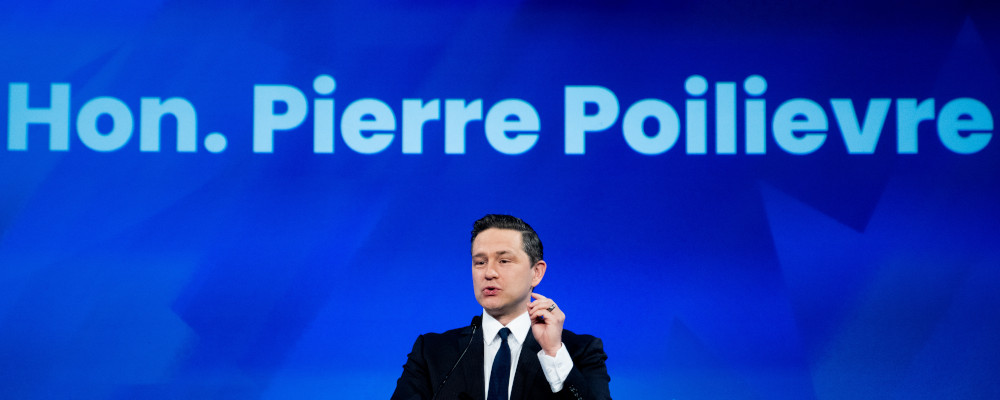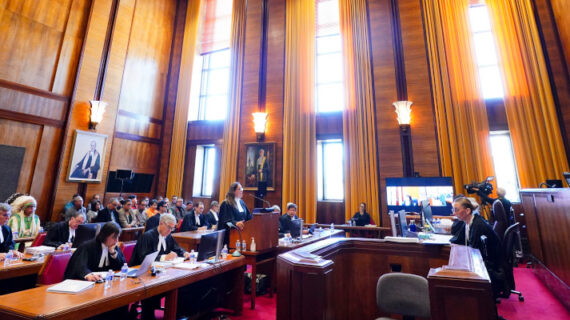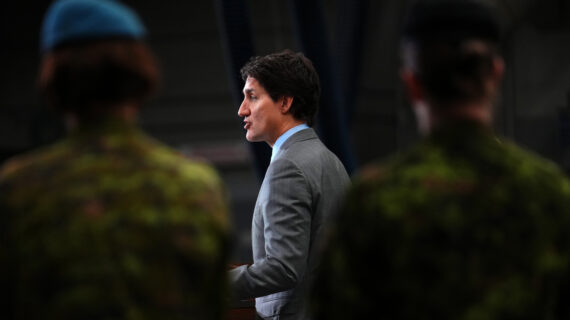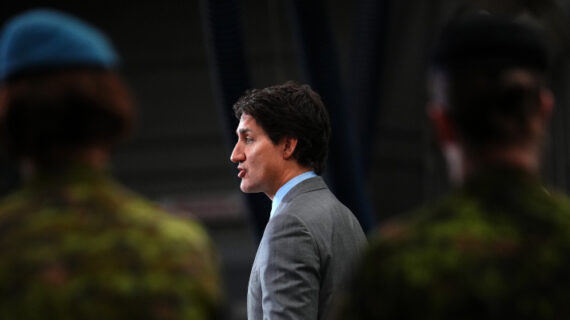Late last Friday night at some ungodly hour, a gaggle of business casual conservatives stumbled out of Ottawa’s Byward Market and voiced their frustrations in the direction of Parliament Hill. “F— Trudeau!” “Axe the tax!” they were heard yelling into the cold spring night. They repeated these lines over and over again.
Their chants stood in stark contrast to a speech thoughtfully delivered that same week by former long-time Harper cabinet minister Jason Kenney. The one-time Alberta premier, a politician rejected by the populist wing of his provincial conservative party, spoke in Ottawa about how “the conservative tradition,” “origin,” and “philosophy” should inform Canadian public policy. He did not swear once.
The chanting cadre was attending the Canada Strong and Free Networking Conference, a yearly event that brings together Canada’s conservative movement. Tories of all shades of blue descend on Ottawa for three days of hobnobbing, celebrations, campaign training, and policy panel discussions. The event advertises itself as a place to build stronger relationships “amongst the movement’s various components.”
I decided to attend, to take the pulse of a conservative movement on the verge of what polls are showing could be a massive Conservative majority government. What I noticed was two distinct strands of Canada’s new conservative movement under Pierre Poilievre: a partisan intellectual establishment old guard, and a newer loud, proud, and angry populist base. The question of how these two groups get along, who’s in control, and whether their aims are at odds with one another will reveal how an increasingly inevitable Prime Minister Pierre Poilievre will govern. Both groups will understandably expect to be heard.

Changing shape
It’s been just over 20 years since the populist Canadian Alliance (formerly the Reform Party) and the Progressive Conservative Party agreed to merge. As Stephen Harper, the Conservative Party’s first leader, describes it, he set out to create a “populist conservative” movement that he sold as “putting conservative values and ideas into the service of working people and their families.” The conservative ideology would be the vehicle to help the common people. It was, as he says, “about using conservative means for populist ends,” all while avoiding a “populist insurgency.”
Today, as Poilievre continues to fill gymnasiums and factories across the country with hundreds of new voters sick of the “elite” and hell-bent on “axing,” “ditching,” and “defunding,” and having all but swallowed PPC supporters, one wonders if it has now morphed into a sort of “conservative populist” movement seemingly driven by the common people who then dictate the tone of the conservative ideology.
To understand this better I spoke to two young conservatives who had deep insights when it comes to these camps. I granted my old guard and populist informants anonymity, so they could speak freely about the new face of the moment, its strengths, along with its tensions and growing pains.
The populist class
If the Canada Strong and Free Networking Conference had a theme song it would have been Twisted Sister belting out “We’re not gonna take it anymore.” Many of the angry populists testing the conservative waters have simply had enough. They are convinced their worsening standard of living is the direct result of a near decade of Liberal rule in Ottawa.
“The infrastructure that they grew up with, that they could count on and rely on, like health care, is crumbling. The country that they grew up in is not the country that they are living in right now. And their opportunities for themselves, and their opportunities for their kids and grandkids, are not what they had,” describes my populist informant. “And they see Trudeau as the source of their problems.”
It all makes for a depressing outcome. Together, he says it has destroyed their sense of self-worth.
This feeling of being left behind is what Poilievre has been tapping into. Although many of these populists are not traditionally conservative, Poilievre is telling them what they want to hear. And he’s doing it in the form of easily digestible slogans and soundbites. His overall message? I know what’s hurting you. But I also know the simple solutions. And I’m the one who can fix it.
“They believe in the Conservative Party and they believe it’s going to answer their call,” the populist assures me. But the thing is, someone else is on the call.
The old-guard intellectual class
The old-guard establishment sees Poilievre stoking populist anger often at the expense of winning over what they call the ideas and governing class of conservatives. Unlike their populist bedfellows, some are growing tired of the leader’s catchphrases and want some policy meat to be put on the bone.
“Enough of the slogans. Tell me what you’re actually going to do,” says my old guard informant.
Last month, Poilievre said “corporate lobbyists in Ottawa” have been “utterly useless in advancing any common sense interests for the people on the ground.” He’s since called for “more boots, less suits.” At his Strong and Free keynote last week, he again delivered a populist battle cry railing against Trudeau-supporting “ivory tower elites.” He received major cheers but irked some in the crowd.
“We [conservatives] don’t need elitism. But we absolutely need to have elites who are not just well educated, but who embody a certain degree of wisdom and who are to the task of taking on these leadership roles in society,” says the old guard informant. “It’s a certain quality of excellence with which you approach leadership and governance.”
Meanwhile, their populist partners could care less if elites feel targeted. They consider many of the old guard to be political opportunists leaping effortlessly back and forth between government and lobbying firms. To them, these people can’t relate to average Canadians.
“I think it’s really…normal Canadians versus a group of people who are careerists and entirely driven by political opportunity and calculation and want to and seek power and seek a life in politics,” explains the populist.
For him, there is a condescending message from the Canadian establishment to the populists that sounds something like, “We don’t really need to listen to them. They’re just being guided by their own misplaced emotions. And we know what’s best for them.”
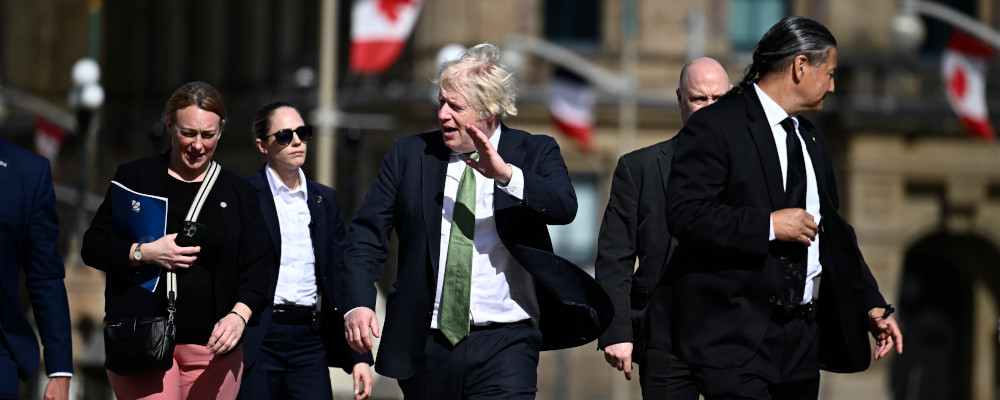
Nodding to conspiracy and skepticism
A strain of conspiracy and skepticism can also be found within these conservative groups. Upon registering at the Canada Strong and Free Networking Conference each attendee was handed a book entitled “Against the Great Reset: Eighteen Theses Contra the New World Order.” The book describes how the World Economic Forum (WEF) and an “insatiable elite” have been capitalizing on the fallout of the COVID-19 pandemic and working “to keep the citizenry pacified.” Its jacket includes praise from none other than former Trump strategist and since-criminally sentenced Steve Bannon, who calls the essays “electrifying.” This book highlighted the controversial fringe element that had a small presence at the conference. Their concerns have received a slight nod from Poilevre, who has promised to ban his future ministers from attending WEF conferences.
Our old guard says these are distracting fantasies that swirl online.
“The WEF is a forum. It’s not above criticism,” says the old guard informant. “[But] when you start getting into this conspiratorial stuff, I think you’re playing with fire, and it’s irresponsible because there are people out there who don’t know better and who actually think there is some massive conspiracy, that there’s this globalist cabal of elites that are running the show from which Trudeau is taking his orders.”
But the populist I spoke to says Canadians need to have more sympathy for people inevitably drawn to these conspiratorial ideas. He adds that while the next prime minister should not act on these ideas in a major way, they should not merely dismiss the people who believe them.
“Life for so many in this country has become so miserable, and so difficult. Things have taken such a shocking U-turn for most of them that they can’t pinpoint what’s going on,” he explains. “And they are desperately searching for answers and justification as to why this has happened to them.”
Another element found in the populist mindset reared its head during the conference speech from Boris Johnson. The former U.K. prime minister felt the need to open his remarks by directly addressing Canadian conservatives who are growing wary of funding Ukraine’s defensive war against Russia.
“The lesson is that the Ukrainians will do the job if we give them the tools,” the former Conservative prime minister told a packed conference room to moderate clapping. “There’s a lot of propaganda out there. There’s a lot of negativity. You see it on some of, I’m sad to say, even on the conservative networks in the United States. You see this stuff that is basically taking the Putin line. It is completely wrong.”
But some more isolationist conservative populists disagree with the idea that the $9.5 billion Canadian dollars that has been spent assisting Ukraine has actually improved their lives here at home.
“Foreign policy does not change the lives of people who are in a really bad way right now. Foreign policy cannot bring back the Canadian lives of children who have been killed by fentanyl overdoses. It can’t put money back into people’s pockets who are who are bankrupt,” says the populist.
While one did not come across outright climate change denial at Strong and Free, climate change skepticism was there throughout. Boris Johnson also faced criticism for his former government’s support of “net zero” carbon dioxide by 2050. He defended himself, saying it was because he’d been convinced by the U.K.’s top scientists.
“As conservatives, I don’t think we can afford simply to say to the public, to young people that really care about this, that we are junking the whole agenda,” he insisted to a quiet crowd. “People want to see that there’s a plan and a program in a proper conservative way.”
Poilievre has yet to release a detailed climate plan beyond carbon tax axing.
Skeptic populists see Canada as not having a large impact on global temperatures and view government policies as attacking their resource jobs.
“I think there’s a very slim minority of Conservative Party supporters who are committed to [combatting] climate change and want to see the party really embrace it,” says the populist.
Governing
In election year 2025, the modern Conservative Party will be powered by an old-guard and populist twin engine. But winning an election is one thing. Governing a country is something else entirely. For this conservative populist engine to hum while in government, Poilievre will need to figure out how he responds to each of these groups.
In the final discussion of the Canada Strong and Free Networking Conference the Conservative Party’s newest MP Jamil Jivani, likely sensing a greater need for cooperation, asked what compromise looks like when a “diverse conservative coalition” puts ideas into practice.
One wonders how populist anger can be harnessed and translated into thoughtful policy. It’s also more difficult to point to an elite boogeyman who’s making mistakes when your guy is the one in power. There will be no “libs” to “own” if that party is decimated to a handful of seats.
Unlike 2006, when Harper’s newly united party swept to power in the first conservative election win in 18 years, today’s Conservative Party would have old-guard experienced veterans to tap to fill in a Trudeau-sized governance hole. But those elites must not lose sight of the populist base.
“It’s these people that are going to give them their chance to get back into office,” says the populist. “They can disregard them at their own peril.”

